Choosing a B2B SaaS Marketing Agency
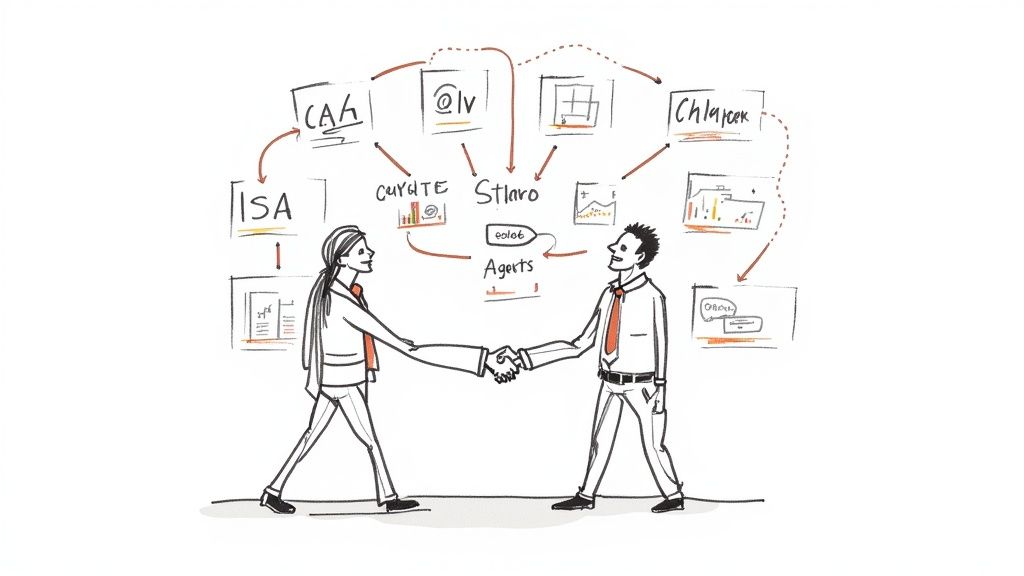
Choosing the right B2B SaaS marketing agency can be rocket fuel for your startup. But picking the wrong one? It’s a fast way to drain your budget and completely stall your growth.
The secret is knowing exactly what you need before you even start looking. This isn't just about hiring help; it's about finding a genuine growth partner who understands your vision and is ready to build with you.
Defining What Success Looks Like for You
Before you schedule a single discovery call, the most critical work happens inside your own company. I've seen it time and again: a successful agency partnership is always built on a foundation of absolute clarity. Without it, you're just throwing money at tactics and hoping something sticks.
Think of this initial phase as creating a detailed blueprint for what a "win" actually looks like. It’s about turning vague desires like "we need more leads" into a strategic framework that will guide every decision you make from here on out.
Set Specific, Measurable Objectives
First things first, we need to move beyond generic goals. "Increase brand awareness" is a wish, not an objective. A much more powerful goal is something like, "Increase our share of voice for key industry terms by 15% in the next six months." See the difference? That's a clear target an agency can actually aim for.
Your business objectives should be the starting point for your marketing goals. Here’s how that connection might look for a B2B company:
- Business Goal: Decrease customer acquisition cost (CAC) by 20%.
- Marketing Objective: Generate 500 marketing qualified leads (MQLs) per month from organic search with a target cost-per-lead of $75.
- Business Goal: Increase annual recurring revenue (ARR) by $1M.
- Marketing Objective: Drive 100 product demo requests per quarter through targeted paid media campaigns aimed at enterprise buyers.
Honestly Assess Your Internal Capabilities
Now it’s time for a candid look in the mirror. What are your current marketing efforts really good at, and where are the genuine gaps? Maybe your small team is brilliant at creating content but has zero experience with technical SEO or paid acquisition.
An honest self-assessment helps you pinpoint precisely where a SaaS marketing agency can add the most value. This crucial step prevents you from paying for services you could (and maybe should) handle in-house.
A great agency doesn't just execute tasks; they fill critical gaps in your expertise and capacity, acting as a true extension of your team. This clarity prevents overlapping efforts and ensures every dollar is spent on moving the needle.
Refining this internal vision is the first step in learning how to measure marketing effectiveness from an external partner. It establishes the baseline from which all future success will be judged.
Finally, get your non-negotiables down on paper. This includes your budget (be realistic!), your ideal customer profile (ICP), and the key performance indicators (KPIs) that truly matter to your business. For a B2B SaaS company, these often include metrics like LTV:CAC ratio, MQL-to-SQL conversion rate, and pipeline velocity.
Doing this prep work ensures you enter conversations with agencies from a position of strength, ready to find a partner who is genuinely aligned with your growth.
Validating an Agency’s SaaS Expertise
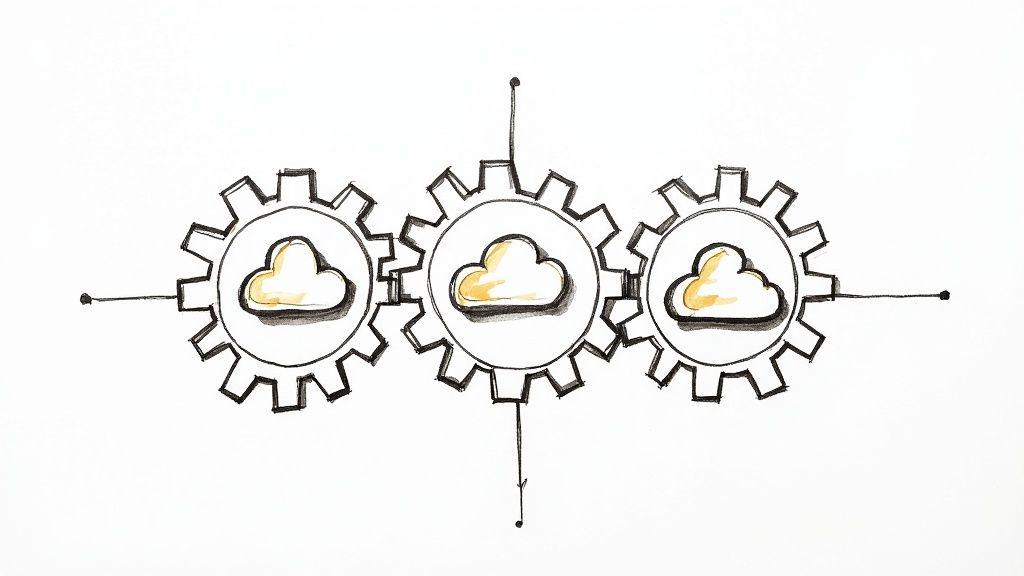
A slick sales deck is just the cost of entry. The real test is digging deeper to see if an agency truly understands B2B SaaS. In a world of long sales cycles, sophisticated buyers, and unique metrics, generic marketing experience isn't just ineffective—it's a liability.
You're looking for a partner who lives and breathes the SaaS business model. They should be just as comfortable talking about churn, LTV, and CAC as you are. This isn't just industry jargon; it's the language of growth, and fluency here is non-negotiable.
This has never been more critical. The SaaS market has grown substantially. With some large enterprises now juggling an average of 447 different SaaS apps, the noise is deafening. You need marketing that cuts through.
Beyond the Portfolio: What to Ask
Case studies are a good start, but they're often highlight reels. You need to get behind the polished numbers with questions that reveal their actual, on-the-ground experience.
So, move past the softball questions like, "Tell me about a successful campaign." Instead, get specific to test their B2B SaaS chops:
- Company Stage: "Walk me through your experience with a company at our exact stage. What were their biggest growth hurdles, and how did your strategy tackle them head-on?"
- Industry Niche: "Give me an example of how you've marketed a highly technical product to a non-technical buyer. How did you bridge that knowledge gap?"
- Metric Fluency: "Describe a time you helped a client fix a poor LTV:CAC ratio. What levers did you pull, and what was the bottom-line impact?"
These kinds of questions shift the conversation from a performance recap to a strategic breakdown. An agency with real expertise will light up, ready to dive into the nitty-gritty.
Dissecting Their Case Studies
When you're looking at their portfolio, filter out the noise. A case study about an e-commerce brand is interesting, but it has zero relevance to your B2B SaaS startup. You need to see proof that they can navigate our world.
And here’s a pro tip: look at how they market themselves. An agency's own approach to lead generation for marketing agencies is a huge tell. If they can't effectively generate leads for their own business, how can you trust them with yours?
A truly great SaaS marketing agency won't just show you vanity metrics like traffic and impressions. They'll proudly display the numbers that matter to a founder: trial-to-paid conversion rates, pipeline velocity, and revenue impact.
Finally, ask for references—and actually call them. Talk to founders or marketing leaders at companies similar to your own. Ask about the agency's communication, their strategic thinking, and—most importantly—how they reacted when a campaign wasn't working. That firsthand insight is gold.
Once you find a team that speaks your language and has the results to back it up, you can start digging into the B2B SaaS marketing strategies that convert and build something great together.
Evaluating Their Strategic and Service Capabilities
Once you’ve confirmed an agency has real SaaS experience, it’s time to look under the hood at their strategic thinking. The best SaaS marketing agencies don't just run plays from a dusty checklist; they think like a co-founder.
They’re the ones who will question your assumptions, bring fresh, data-backed ideas to the table, and focus on building a growth engine—not just a disconnected series of campaigns. This is where you separate the task-doers from the true strategists. You’re hunting for a partner who can architect a plan for sustainable growth, not just sell you a pre-packaged service bundle.
Their ability to draw a straight line from their marketing activities to your core business outcomes—like slashing churn or boosting trial-to-paid conversions—is what really separates the great from the good.
Look Beyond the Service List
Every agency website has a list of services like "Content Marketing" or "Demand Generation." On their own, these labels are pretty meaningless. What you need to uncover is the how and the why behind them.
Push them to walk you through their strategic process. Ask them to whiteboard a 90-day plan for a hypothetical company just like yours. A great agency won't start by rattling off tactics; they'll start by asking you tough questions about your Ideal Customer Profile (ICP) and what makes your value proposition unique.
Their first priority will be building a cohesive story. For any B2B SaaS, a solid messaging foundation is non-negotiable, and a partner worth their salt should know how to build a B2B messaging framework that works.
A true strategic partner won't just accept your goals at face value. They'll poke holes in them, help you refine them, and then build a custom roadmap to get there. That’s how you know they’re invested in your success, not just cashing a retainer check.
The modern B2B SaaS marketing funnel isn't a simple, linear path. It's a complex journey that demands a sophisticated, multi-touch approach.
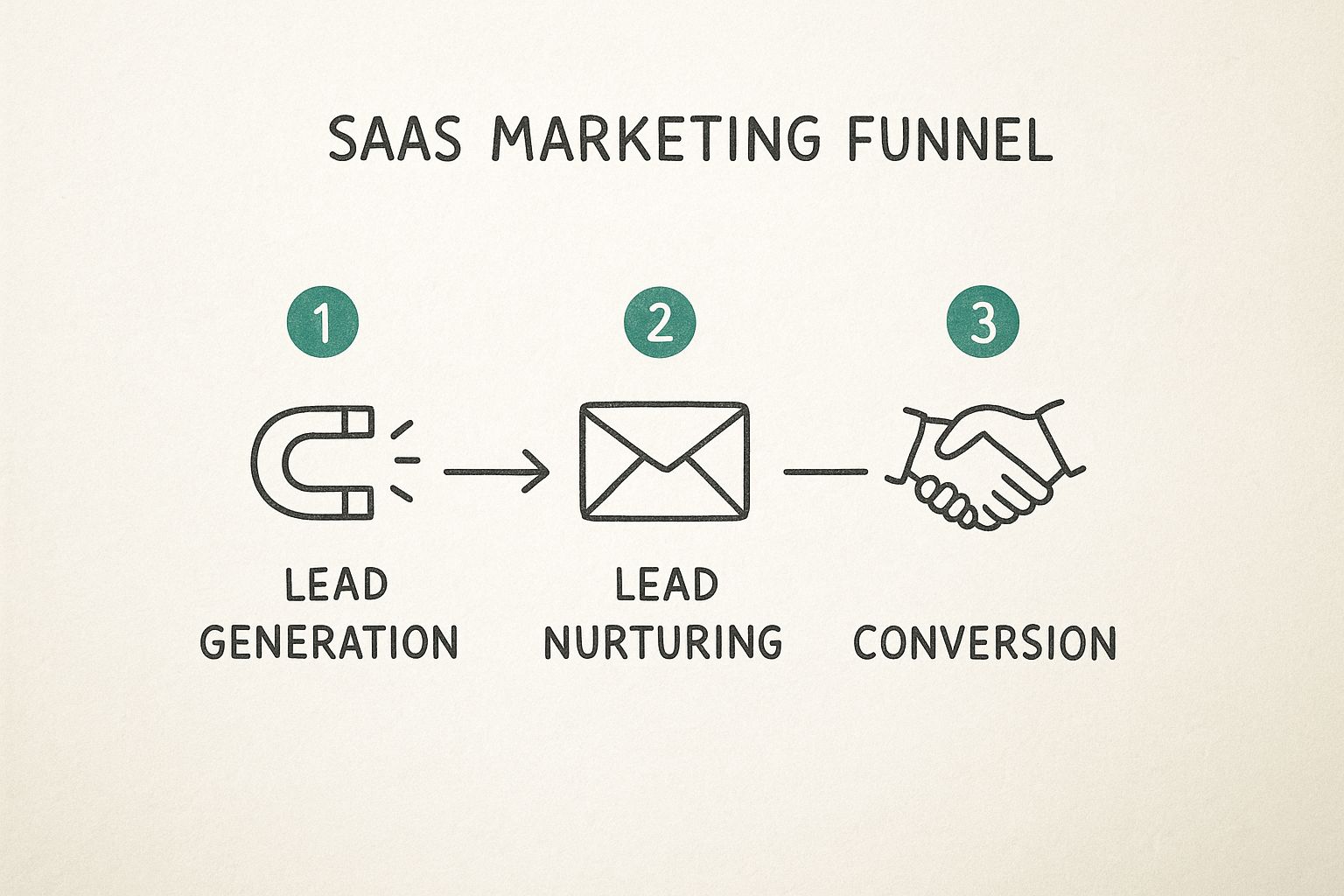
As you can see, success isn't just about pouring leads into the top of the funnel. It's about having the strategic and executional chops to effectively nurture them all the way to a closed deal—a critical capability you need to vet in any potential agency.
Core Capabilities for B2B SaaS Growth
While strategy is the blueprint, execution is what actually builds the house. A capable SaaS marketing agency needs to show deep expertise across several disciplines that are absolutely vital for B2B growth.
And the need for specialization is only getting more intense. Vertical SaaS markets are projected to grow significantly, requiring partners with genuine domain expertise, not generalists.
Here are the essential capabilities you need to dig into:
- Demand Generation: Can they actually build and manage multi-channel campaigns (think PPC, LinkedIn Ads, etc.) that drive a steady stream of high-quality MQLs? Ask for proof.
- Content & SEO: Do they have a repeatable process for creating truly expert-level content? You're looking for content that doesn't just rank for high-intent keywords but also genuinely educates and persuades your target buyers.
- Product Marketing: How do they plan to support your product? Dig into their experience with feature launches, user onboarding, and activation campaigns that are designed to improve retention and drive expansion revenue.
- Marketing Operations: How fluent are they in the modern B2B tech stack? Probe their proficiency with platforms like HubSpot, Marketo, and Salesforce. A key part of their operational skill is the toolkit they use, which includes the best social media management tools for agencies that help them execute efficiently.
By grilling them on both their strategic brain and their hands-on capabilities, you can find an agency that doesn't just talk a good game but has the framework and skills to actually deliver.
Agency Service Model Comparison
Choosing an agency isn't just about what they do, but how they do it. Agencies typically operate under a few primary service models, and understanding the differences is key to finding a structure that aligns with your team’s needs, budget, and goals. Each model comes with its own set of pros and cons.
Think carefully about where your team has the biggest gaps. Are you short on high-level strategy, day-to-day execution, or a specific technical skill? Matching the agency’s service model to your specific needs is one of the most important decisions you’ll make in this process.
Finding the Right Cultural Fit and Communication Flow
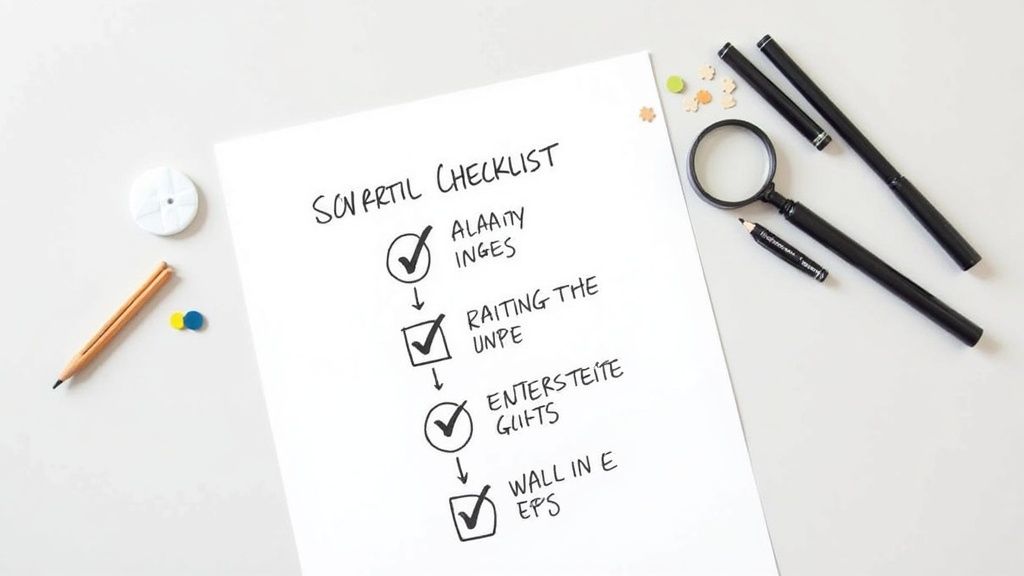
Technical chops and a slick portfolio? That’s just the starting point. The real magic that turns an agency from a simple vendor into a genuine growth partner is something much harder to see on a slide deck: cultural fit.
This isn't some fluffy, nice-to-have bonus. Getting the culture and communication right is the absolute bedrock of a long-term, successful partnership.
Think about it—you're bringing this agency into your inner circle. They're an extension of your team. If their communication style drives you crazy or their values just don't click with yours, even the most amazing strategy will eventually stall out. That constant friction quietly kills momentum and turns a promising partnership into a grind.
Are They Genuinely Curious?
You can learn more about an agency’s culture from the questions they ask than from the answers they give. A partner who’s truly invested in your success will be relentlessly curious. They won't just ask about your marketing goals; they’ll want to understand your business vision, your product roadmap, and what keeps you up at night as a founder.
Pay close attention to the kinds of questions you get in those first few calls.
- A transactional agency asks: "What's your monthly budget for paid ads?"
- A strategic partner asks: "How does your current CAC impact your ability to scale? What's the LTV you need to hit for this channel to become a sustainable growth engine for the business?"
The difference is huge. The first is about checking a box and executing a task. The second is about solving a core business challenge. A great saas marketing agency is obsessed with the latter. They show their passion not with a flashy sales pitch, but with a real desire to get inside your world.
Nailing Down Communication and Transparency
Miscommunication is the silent killer of agency partnerships. Before you sign anything, you have to get painfully clear on what the day-to-day communication will actually look like. There’s no single "right" way, but there absolutely has to be a system that both sides agree on and stick to.
Any agency that’s confident in their work will be an open book. They should be eager to give you direct access to data, build clear reports that tie back to business impact, and establish a regular rhythm for strategic check-ins.
Here's a practical checklist to run through before you commit:
- Reporting Style: Ask what you'll get. Automated dashboards? Custom-built reports with actual analysis? A mix? Insist on reports that connect marketing spend to revenue, not just vanity metrics like clicks and impressions.
- Meeting Rhythm: How often will you connect for strategic planning versus quick tactical syncs? A good cadence might be a weekly tactical huddle and a more in-depth strategic business review monthly or quarterly.
- Your Main Contacts: Who is your day-to-day go-to person, and who owns the high-level strategy? Make sure you’ll have access to the senior-level experts who impressed you in the sales process.
- Handling Problems: This one is critical. Ask them to walk you through their process for when a campaign isn't working. A great partner doesn’t hide bad news. They bring it to you proactively, along with a plan of action and a clear-eyed analysis of what they learned.
Ultimately, you’re looking for an agency that feels like they’re in the trenches with you. When you find a partner who communicates clearly, shares your passion, and is just as obsessed with your success as you are, you’ve found a powerful force for growth.
Building a Strong Foundation for Partnership
You’ve gone through the proposals, vetted the expertise, and found an agency whose culture just clicks with yours. This is the moment where all that potential starts turning into real momentum.
But signing the contract isn’t the finish line. It’s the starting block. The first few weeks of any new partnership are absolutely critical for setting the right tone and making sure you hit the ground running.
This is your chance to move from high-level talks to a concrete, actionable plan. A strong start isn't just about feeling good—it’s about getting rid of the friction that can derail things down the road. Getting crystal clear now prevents expensive misunderstandings later.
Forging Clarity in the Contract
Before any work kicks off, that contract needs to be more than just a legal formality. Think of it as the blueprint for your partnership. It’s where you turn verbal agreements into written commitments and kill any ambiguity before it can cause problems. A well-built contract protects both you and the agency, making sure everyone is aligned on the mission.
This document should spell out the specifics of your engagement. Make sure it includes these key pieces:
- A Detailed Scope of Work (SOW): This can’t be vague. Instead of just "Content Marketing," it should specify something like, "Four 1,500-word blog posts per month targeting specified keyword clusters." The more detail, the better.
- Clear Performance Metrics: How will you know if you're winning? The contract must define the KPIs that matter to your business, whether that’s MQLs generated, pipeline influenced, or hitting a target LTV:CAC ratio.
- Defined Reporting Cadence: Lock in the frequency and format of performance reports. This ensures you get the strategic insights you need, not just a data dump every month.
- An Exit Clause: Things don't always work out. A fair termination clause provides a clear, professional off-ramp if the partnership isn’t the right fit, giving both sides security and peace of mind.
Launching with a Powerful Kickoff
The kickoff meeting is your single best opportunity to set a powerful precedent for collaboration. This isn't just a meet-and-greet; it’s a strategic alignment session where you officially shift from "client and vendor" to one unified team.
The goal here is simple: leave that meeting with a shared sense of purpose and a clear path forward.
A great kickoff doesn't just review the contract; it breathes life into it. It’s where you collectively agree on the "rules of engagement," define what success actually looks like, and build the human connection that fuels a great partnership.
This is also the perfect time to map out your initial 90-day plan. This plan should be aggressive but realistic, zeroing in on a few key initiatives that can generate immediate momentum and build trust. It’s all about securing some early wins to prove the partnership's value and get everyone fired up for the road ahead.
By starting with this much intention, you're not just hiring a saas marketing agency—you're laying the groundwork for a long-term alliance. This proactive start ensures you and your new partner are perfectly aligned and ready to do some amazing things together.
Still Have Questions About B2B SaaS Agencies?
Deciding to bring in an external team is a big move. Even with a solid plan, it's natural for founders and marketing leaders to have some lingering questions as they get serious about their options.
Getting straight answers is the only way to move forward with confidence and build a partnership that actually drives growth. Let's tackle some of the most common questions that pop up when B2B SaaS companies start thinking about hiring an agency.
How Much Should We Really Budget for a B2B SaaS Agency?
This is always the first question, but the answer isn't just one number. Agency costs swing pretty widely based on the scope of work, their reputation in the market, and where your company is in its growth journey.
Here’s a realistic breakdown:
- For Early-Stage Startups: If you're just getting off the ground, you're likely looking at project-based work. Think building a solid messaging framework or running a targeted launch campaign. These kinds of focused projects usually land in the $5,000 to $10,000 range.
- For Growth-Stage Companies: Once you have some traction and need a more comprehensive, ongoing partnership, you'll be looking at a retainer model. These retainers can start around $15,000 per month and go up to $50,000+ for a full-funnel strategy covering multiple channels and high-level oversight.
The most important thing? Figure out your business goals first. Then, look for proposals that are built to hit those specific objectives. Your focus should always be on the potential ROI, not just the monthly invoice.
What's the Real Difference Between a Generalist and a Specialist Agency?
Look, a general digital marketing agency might be fantastic at running ad campaigns for a local dentist, but they almost always lack the deep, nuanced understanding of how a SaaS business actually works. This isn't a small detail—it's everything.
A specialized SaaS marketing agency lives and breathes the metrics that run your business: MRR, LTV, churn, and CAC. They get the painful realities of long B2B sales cycles, they understand the mechanics of product-led growth (PLG), and they know how to market complex software to people who are tired of being marketed to.
This specialization means you get more effective strategies and see meaningful results much faster. If you're a founder looking for that kind of high-level strategic input, it can also be valuable to explore what a dedicated B2B marketing consultant can bring to the table.
An agency that already speaks your language can start adding value from day one. You won't waste the first three months of your engagement teaching them the basic principles of the SaaS world.
How Long Until We Actually See Results?
This is where you need a dose of patience mixed with clear expectations. The timeline for results depends entirely on the marketing channels you're using.
Paid media campaigns on a platform like LinkedIn can start generating initial data and even some leads within a few weeks. It's a great way to get quick feedback.
On the flip side, content marketing and SEO are the long game. Building real authority and driving significant traffic from organic search is a 6 to 12-month commitment of consistent, high-quality work. There are no shortcuts.
A good agency will be brutally honest about this. They'll lay out a strategic roadmap that balances short-term wins to build momentum with the long-term goals that create a sustainable growth engine. If an agency promises you immediate, world-changing results across every single channel, you should be very, very skeptical.
Ready to build a marketing engine that drives predictable growth for your B2B SaaS? Big Moves Marketing acts as your fractional CMO, bringing over 15 years of strategic expertise to help you clarify your message, position your product, and execute campaigns that deliver real results. Let's make your next move your best one. https://bigmoves.marketing
%20png%20copy.png)

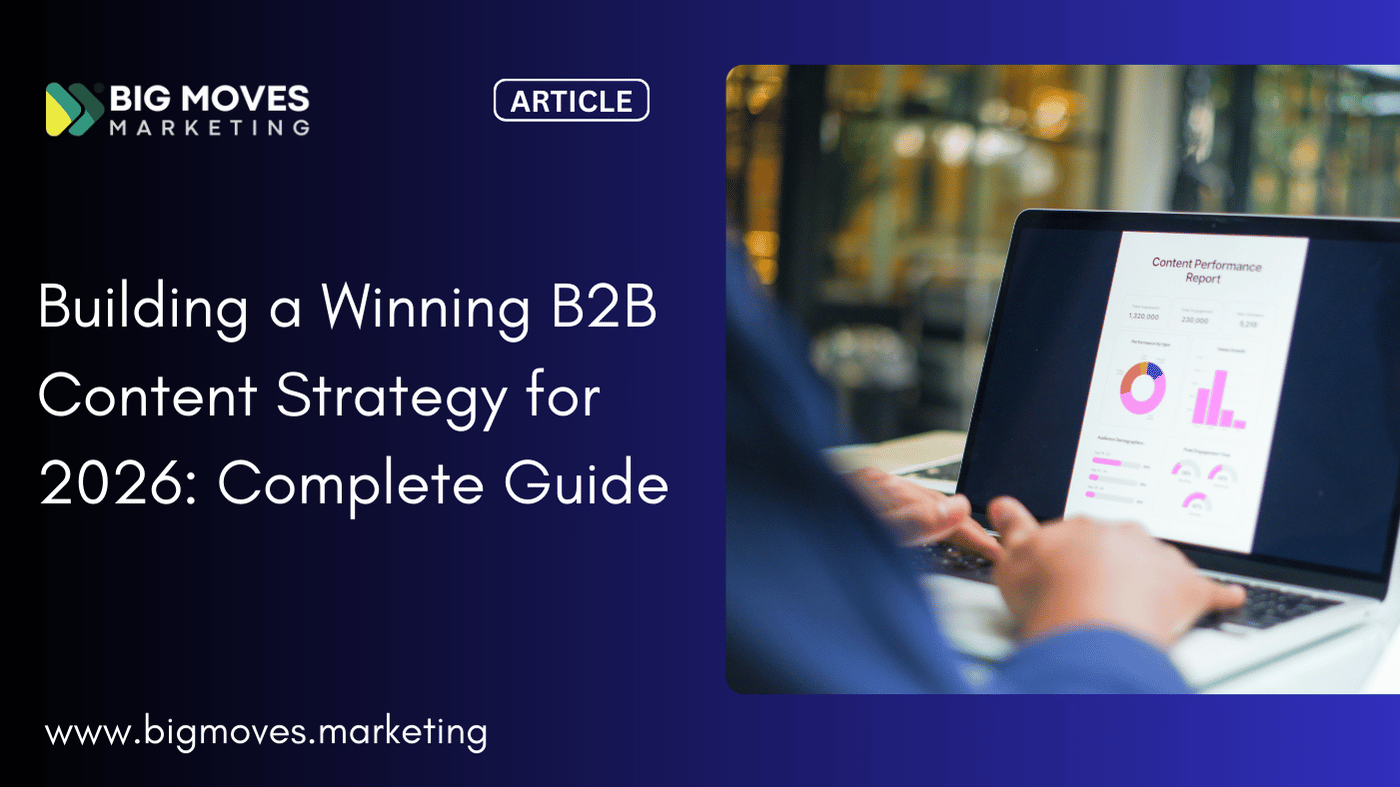

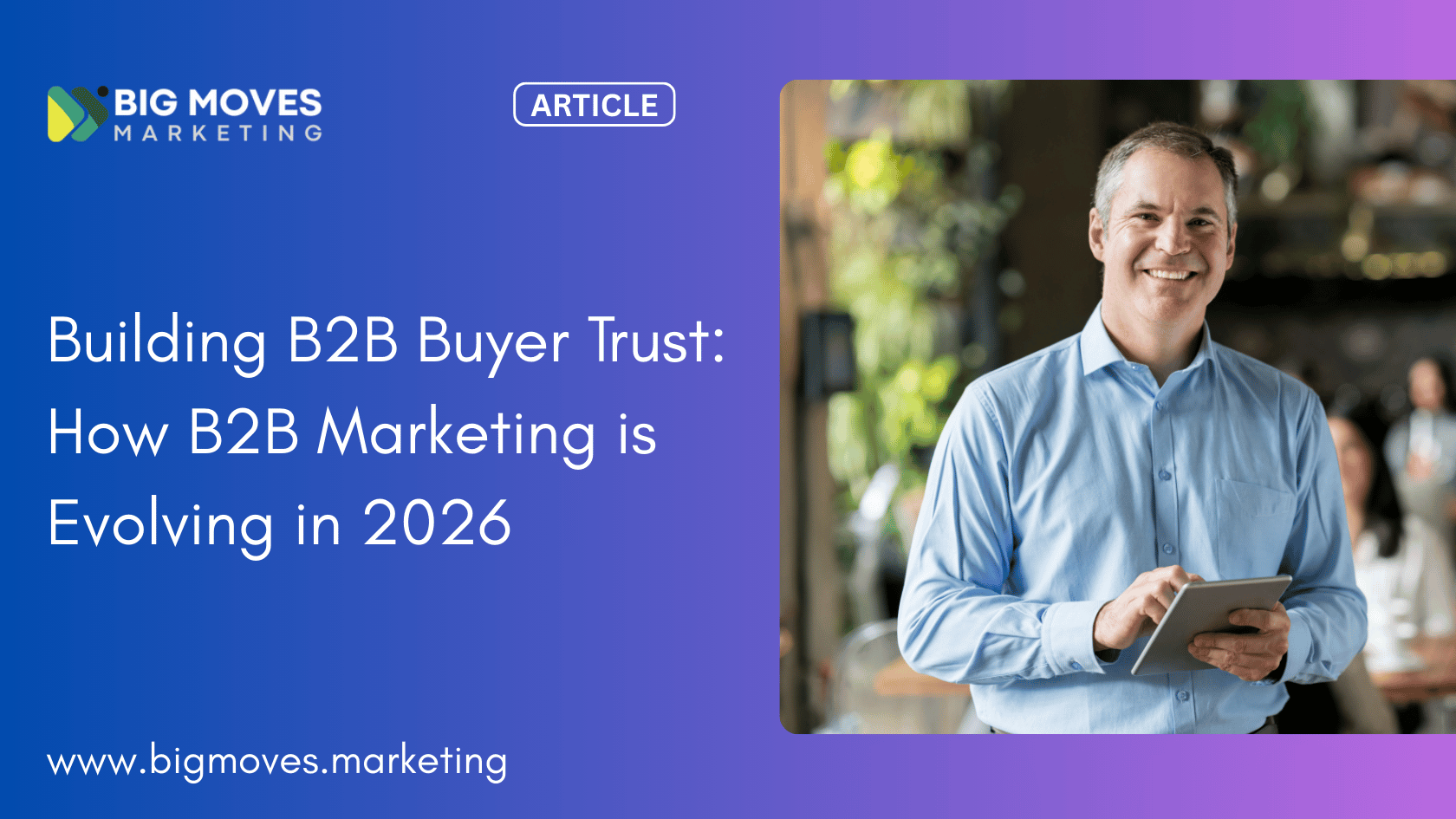


%20-%20white.svg)
